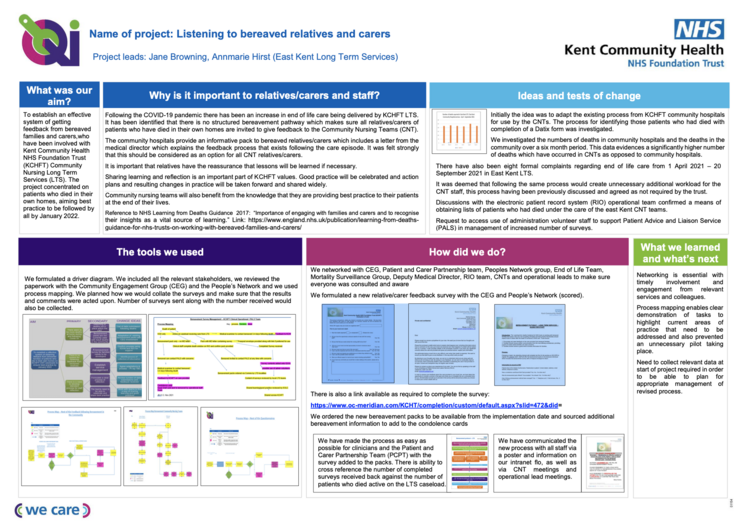Losing a loved one is an incredibly difficult time.
If a patient has died in the care of Kent Community Health NHS Foundation Trust (KCHFT), whether that is at one of the trust's community hospitals, or at home, KCHFT does all it can to give support. However, with the help of families and carers, the trust thinks it could do better.
Working with bereaved people, KCHFT has already made some changes to the way it does things. But the trust is still keen to learn more to understand what is done well, what is not so good and about anything extra which could be provided.
KCHFT helps more patients who choose to die in their own homes, than in its community hospitals. For this reason, the trust decided it needed to make its family and carer support and feedback package handed out by community nurses, more robust. Not only does the trust want to make sure people have all the information they need, but hearing back about people's experience of the care, is vital to help KCHFT improve.
The trust had a good look at its bereavement pack and saw that it needed adapting if a patient had died at home. It also decided to put a feedback survey into the pack, rather than one being posted later, with the questions put together with the help of carers, relatives and patients who sit on one of KCHFT's community engagement groups.
Jane Browning, Patient and Carer Partnership Project Manager at KCHFT, said: “We looked at our bereavement packs and rather than a one size fits all, we made some changes to the home pack, to make them more applicable and relevant. At the same time, we changed how and when we ask for feedback, to help us make changes, learn and continually improve."
The bereavement packs now include a condolences letter and information about bereavement support, including points of contact for questions or concerns. The pack lets families and carers know how to raise concerns and asks them to provide feedback on our service, when they are ready. The feedback survey can be returned by post, or people can email or phone the patient advice and liaison service (PALS).
Jane said: “Feedback can highlight issues which may not otherwise be identified, it’s vital to us and we really appreciate it. It is important that relatives have the reassurance that lessons will be learned, if necessary. Sharing, learning and reflection is an important part of our values.”
The work was carried out as a quality improvement (QI project) by KCHFT's Community Nursing Long Term Services Team in east Kent and the changes were soon adopted by the whole of the trust.
Jane added: “Community nursing teams will also benefit from the knowledge that they are providing the best support to their patients at the end of their lives.”
The aim of the QI project was to establish an effective system for getting feedback from families and carers, after a patient has died at home, following involvement with KCHFT’s Community Nursing Long Term Services (LTS), aiming to make sure best practice is followed by all.
To make this happen, the process for getting feedback needed to be changed. Jane used QI tools on the project, including a driver diagram and stakeholder mapping.

Find out more on the KCHFT QI website:

